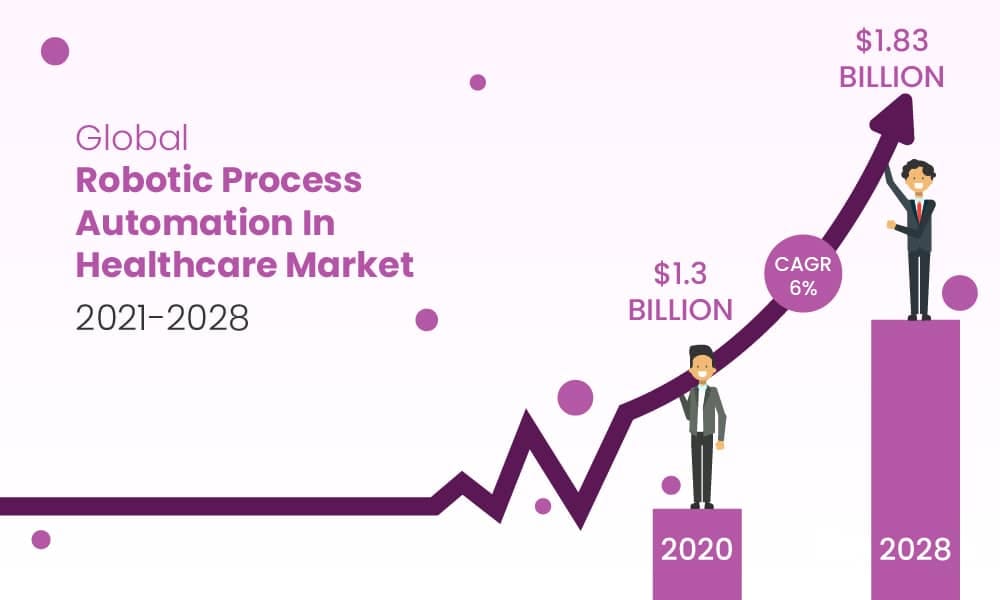
Robotic Process Automation solutions are intended to assist you in reducing human intervention in every step of the healthcare process, hence reducing the potential of error.
With Robotic Process Automation, you can realize the full potential of your healthcare practice. Minimize time-consuming manual activities and provide high-quality care to your patients while increasing efficiency and productivity.
What is Robotic Process Automation (RPA) and What are its Benefits?
Robotic Process Automation is a software application that operates on a computer, laptop, or mobile device. It is a set of commands that are performed by bots in accordance with a set of business rules.
Robotic Process Automation is a software application that operates on a computer, laptop, or mobile device. It is a set of commands that are performed by bots in accordance with a set of business rules.
RPA bots, or simply “bots” are software programmed that you could configure to perform digital tasks. RPA bots are capable of interacting with any system or application in the same way that a human worker would. It’s as simple as telling your bots what to do and then letting them do it.
The primary purpose of the robotics process automation process is to replace humans with a virtual workforce for repetitive and tedious clerical duties.
Benefits or Implementing RPA in Healthcare
Robotic process automation is a feasible alternative for healthcare organizations aiming to serve more patients and improve patient outcomes without incurring large costs or causing employee friction.

Improved User Experience
Everyone nowadays expects individualized services, quick responses, and a frictionless experience. Automation in healthcare can excel in this because a task that takes a human representative more than ten minutes may be completed in two minutes by the bot.
Bots can combine all systems to provide customers with a unified platform. This means that bots can provide customers with rapid information and a high-quality experience. Staff members can utilize time to complete more strategic duties, such as personalizing patients’ services according to specific requirements, and so on.
Minimize Human Errors
Human professionals are more likely to make at least ten mistakes every 100 steps. This is due to the fact that humans dislike performing repetitive jobs. Bots can reduce errors and increase productivity since they are trained to perform a given action in a specified way.
Bots are used to collect, retrieve, and process data, which is then used by people. It supports and enables all mandatory compliance processes providing error-free auditing.
Employee Satisfaction
It is widely assumed that robots will obviate the need for human labor. In truth, robots augment human talents. The competence of human employees is reduced when repetitive, dull jobs are performed.
When, RPA in healthcare takes over this activity, it allows human experts to focus on strategic, intelligence-based roles. This would also benefit healthcare professionals in respect to career advancement and continuous learning.
Improved Revenue Cycle Functionalities’
Revenue cycles can contain a large number of code changes, such as new patient appointment requests, patient pre-arrival and arrival, claim denials, invoicing, and so on, which can be taxing on the system. Robotic process automation is the best way to enable seamless adaptability to these changes, and thus overall coherence.
Data digitization and the automation of repetitive procedures like accounts payable help these administrative processes. Software robots can handle up to 80% of claims and billing more efficiently.
Efficient Appointment Scheduling
With their ability to incorporate information from multiple sources, RPA can significantly improve patient scheduling efficiency. This competency enables them to include a multitude of variables in patients’ appointment requests, such as their past medical history, current diagnosis, geography, insurance carrier, personal choices, and so on, and use them to plan appointments that are most relevant to the patients.
Expectational Healthcare Quality
This is possibly the most comprehensive benefit of deploying RPA in healthcare. Automation enhances patient happiness by reducing time, removing the possibility of human mistake, and allowing employees to concentrate on more valuable, patient-centered activities.
Increased administrative efficiency may also broaden the spectrum of healthcare applications. As a result, the healthcare could better meet the requirements of more individuals. The prospect of adequate healthcare for an increasing number of individuals elevates RPA in healthcare beyond a mere option.

Ways RPA can Improve the Efficiency of Healthcare Organizations – Use Cases
Robotic Process Automation in healthcare will benefit patients by improving their access to and quality of treatment; healthcare professionals by shifting their time and resources away from tedious tasks and towards more critical duties; and healthcare services by reducing costs and allocating funds elsewhere.
Let see some use case of RPA in healthcare.
Use Case1: Discharge Summary
Challenge
Manual creation of discharge summary takes more than 3 hours per patient. Sometimes admins miss crucial information that affects the summary, follow-ups and insurance process.
Solution
The use of RPA can generate the discharge summary in 15 mins.
- Create Custom discharge summary templates o in Ezovion Hospital Management Software.
- RPA displays all the data starting from admission, initial assessment to discharge notification, copy, paste and edit in a customized discharge template. This would help build discharge summary in 15 minutes or less.
- RPA speech to text solutions allows you to build discharge summary, edit and publish discharge summary in 15 minutes or less.
Consider a hospital where 5 patients are discharged per day, and it takes around 3 hours to generate one discharge summary.
Hence, in a single day, it takes 15 hours of hospital administration to create a discharge summary.
Nevertheless, with the usage of RPA in healthcare, it only takes 15 minutes to generate a discharge summary, saving 2 hours 45 minutes per patient. This saves 12 hours and 25 minutes per day.
Instead of monotonous clerical work, the hospital workforce can be utilized more efficiently for better patient care.
Use Case 2: Appointment Scheduling
Challenge
Scheduling a doctor’s appointment is now an online process in many hospitals. Unfortunately, processing these reservations is frequently a manual operation. Consider that there are tens of appointments scheduled for the next few weeks, some of which have already been cancelled or altered, and there’s just one administrator to manage all incoming requests.
Solution
You can use RPA bots to manage patient appointment requests automatically, scheduling, updating, and cancelling them as needed.
- An RPA bot schedules appointments for patients based on their needs as well as the availability of a physician.
- When a patient books an appointment, the bot confirms it in the database and deletes the appointment space.
- Appointment can also be booked from hospital’s website with a calendar plugin.
- The bot also sends an email or SMS message to the patient verifying the appointment details.
Patients can schedule appointments through the hospital website’s calendar plugin. They can pay through a multitude of payment gateways.
Teleconsulting with doctors is possible via patient portal or mobile app, and e-prescriptions can be shared with patients and immediately routed to pharmacies with RPA.
How can we help you?
Robotic Process Automation (RPA) is proving to be a valuable tool in the healthcare industry, allowing hospitals to save time and resources.
RPA by Ezovion
- Can drastically reduce administrative activities that are necessary for medical staff, freeing up time for more patient-oriented tasks.
- Can help streamline processes such as appointment scheduling and billing, reducing manual effort for a variety of tasks.
- Allows healthcare providers to automate repetitive and mundane duties so they can focus on areas where human attention is needed most: providing better care for patients.

Save your time by implementing RPA
Conclusion
Because of its significant benefits in terms of effort, money, and timing, RPA is poised to alter the healthcare business today and in the future.
If you own a healthcare facility and are fascinated in robotic process automation, now is the time to focus on enhancing the experience for patients using Ezovion RPA.
Sign up for a Free Trial Now!









